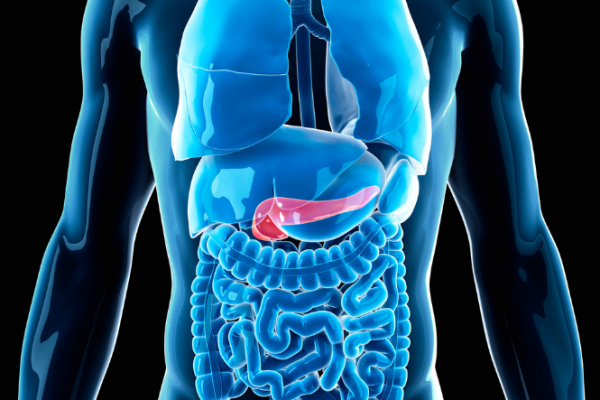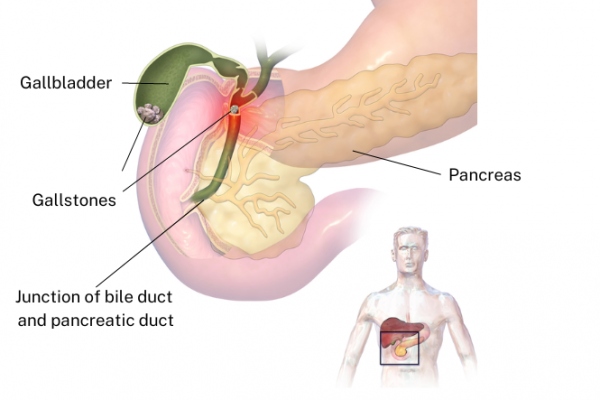You can now add Healthify as a preferred source on Google. Click here to see us when you search Google.
Acute pancreatitis | Mate repe huka kōpauku
Key points about acute pancreatitis
- Your pancreas is part of your digestive system.
- It releases chemicals called enzymes to help with the breakdown of food and to help regulate blood glucose levels.
- Acute pancreatitis (mate repe huka kōpauku) occurs when your pancreas becomes inflamed for a short period of time.
- This is different to chronic pancreatitis, where your pancreas becomes permanently damaged from inflammation.
- The main symptom is abdominal pain which usually settles in a few days but can be severe and the condition can be serious.

Your pancreas is a small organ located behind your stomach and below your ribcage. It's a part of your digestive system. It releases enzymes, or digestive juices, into your small intestine to further break down food after it has left your stomach. It also secretes the hormone insulin into your bloodstream to regulate your glucose levels.
Acute pancreatitis happens when, because of inflammation in the pancreas, the enzymes which normally break down food begin to digest things other than food – like the pancreas itself.
The image below shows the location of the pancreas.
Image credit: Canva
The main symptom of acute pancreatitis is pain in your abdomen (tummy/puku). It usually settles within a few days, but sometimes the pain is severe and the condition can be serious.
Acute pancreatitis is most often linked to gallstones, which cause about half of cases, and heavy alcohol use, which causes about a quarter of cases.
Acute pancreatitis is more common in middle-aged and elderly people, but it can affect people of any age. Men are more likely to develop alcohol-related pancreatitis, while women are more likely to develop it because of gallstones.
While most people can be treated and will recover from acute pancreatitis, 1 in 5 people have a very bad case of it. This can result in life-threatening problems, even the failure of other organs in the body. When such problems develop, there's a high risk of the condition being deadly.
There is also a high chance that people who suffer ongoing bouts of acute pancreatitis will eventually go on to develop chronic pancreatitis.
| Contact your healthcare provider immediately if you suddenly develop severe abdominal pain. If this isn't possible, phone 111 or go to your local A&E department. |
|---|
Acute pancreatitis is caused:
- When a gallstone gets stuck where the bile duct and pancreatic duct join up and open into the small intestine. The stone blocks the enzymes normally released by the pancreas and causes inflammation (see image below).
- As the result of a bout of heavy drinking, usually about 6–12 hours later, although why this happens is unclear.

Image credit: BruceBlaus via Wikimedia Commons(external link) with labels added
Rare causes include:
- some viral infections
- injury or surgery around the pancreas
- colonoscopy
- some autoimmune diseases
- certain medicines
- very high blood levels of calcium or triglycerides (fats).
Video: Acute Pancreatitis
The following video is about acute pancreatitis. It may take a few moments to load.
(The National Pancreas Foundation, US, 2013)
The main symptom of acute pancreatitis is sudden, severe pain in the upper or middle part of your tummy (puku) just below your ribs. This pain often gets worse, and it sometimes moves towards your back or to just below your left shoulder blade. You may feel worse when you eat or drink, especially fatty foods. Lying flat on your back often makes the pain worse. Leaning forward or curling into a ball may help to relieve the pain.
You may also experience:
- feeling sick (nausea) or being sick (vomiting)
- a high temperature (fever)
- your abdomen swelling
- diarrhoea (runny poo).
Diagnosis
You will be admitted to hospital where doctors will look for the cause of your severe abdominal pain and vomiting. You are likely to have blood tests, an ultrasound, or a CT scan of your tummy.
Treatment
If you experience severe pain, you will be admitted to hospital, where you are likely to be given pain relief medicine, as well as fluids into your veins (intravenous fluids) to prevent dehydration. To give your pancreas time to recover, you may be advised not to eat solid food for a few days. Once the inflammation in your pancreas is controlled, you may begin drinking clear liquids and eating bland foods. With time, you can go back to your normal diet.
Depending on the severity of your condition, a feeding tube may be used to provide your body with nutrients if you can't eat. This involves inserting a tube through your nose (nasogastric tube) into your stomach.
If the cause is a gallstone, you may need a procedure to remove it, and if the area around your pancreas gets infected you may need to take antibiotics.
Most people with acute pancreatitis improve within a week and are well enough to leave hospital after 5–10 days.
Even if alcohol was not the cause of your acute pancreatitis, stopping drinking alcohol is important in the short term, and if alcohol was the cause, for the long term.
If a gallstone was the trigger, then changing to a low-fat diet may make gallstones less likely.
Apps reviewed by Healthify
You may find it useful to look at some Alcohol use apps and Nutrition, exercise and weight management apps.
There are online support groups for people with chronic pancreatitis, eg, Facebook support group for chronic and acute pancreatitis.(external link)
Acute pancreatitis(external link) Patient Info, UK
Gallstones diet sheet(external link) Patient Info, UK
Alcohol & you – facts & effects [PDF, 5.3 MB]Health Promotion Agency, NZ
Apps
Nutrition, exercise and weight management apps
Alcohol use apps
References
- Acute pancreatitis(external link) NHS Choices, UK, 2022
- Acute pancreatitis(external link) Patient Info, UK, 2016
- Tatley M. Drug-induced pancreatitis – an unlucky DIP. MedSafe Prescriber Update 2005;26(2):32-33. medsafe.govt.nz/profs/PUarticles/pancreatitis.htm(external link)
- Khashram M, Frizelle FA. Colonoscopy – a rare cause of pancreatitis(external link) 2011;124(1345):74-76.
Goodchild G, Chahoun M, Johnson GJ. Practical guide to the management of acute pancreatitis(external link) BMJ Frontline Gastroenterology 2019;19(3):292-299
Pancreatitis(external link) NICE guidelines. UK
Biliary colic and complications from gallstones(external link) BPAC, NZ, 2014
IAP/APA evidence-based guidelines for the management of acute pancreatitis(external link) Pancreatology 2013;13(4):e1-e15.
Apps
Nutrition, exercise and weight management apps
Alcohol use apps
Credits: Healthify editorial team. Healthify is brought to you by Health Navigator Charitable Trust.
Reviewed by: Dr Art Nahill, Consultant General Physician and Clinical Educator
Last reviewed:





